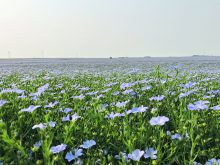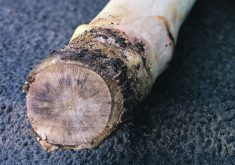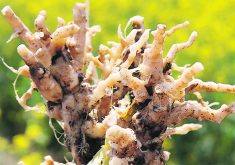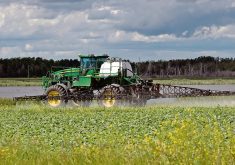SASKATOON — Saskatchewan’s canola and flax growers have voted to approve the amalgamation of their two grower groups.
Resolutions were passed at both the Saskatchewan Canola Development Commission (SaskCanola) and Saskatchewan Flax Development Commission (SaskFlax) annual general meetings.
“The collaborative efforts are expected to streamline operations, enhance research initiatives and provide a more cohesive voice for oilseed growers in the province,” said SaskCanola executive director Tracy Broughton.
The next step is working with the Agri-Food Council to amend regulations. The amalgamation will officially commence at the start of the next crop year Aug. 1, 2024.
Read Also

New coal mine proposal met with old concerns
A smaller version of the previously rejected Grassy Mountain coal mine project in Crowsnest Pass is back on the table, and the Livingstone Landowners Group continues to voice concerns about the environmental risks.
SaskCanola has been providing operational support for SaskFlax since January 2022.
Broughton said the two organizations have already worked out most of the operational and administrative challenges and now it is time to turn their attention to issues such as breeding and market development.
“We haven’t really had a chance to spend lots of time on the programming side of it because we’ve been focusing on how do we close down the office and move everything over here,” she said.
“Now it’s more of the interesting stuff, so that’s pretty exciting for me and my team.”
SaskFlax chair Greg Sundquist thanked the SaskCanola board for approaching them last year and proposing the amalgamation after SaskFlax lost long-time executive director Wayne Thompson to the Western Grains Research Foundation.
“We’ve seen the benefits of this amalgamation in that fact that we’re now part of a larger organization that has more reach than we can ever imagine if we were trying to do it with $400,000 from SaskFlax,” he said.
That is the amount of annual levy revenue generated by the organization in recent years.
Broughton said there are still details to be worked out, such as governance issues and whether to rebrand the new organization.
Both boards have decided that the new organization will have an eight-member board, which is the same size as SaskCanola’s existing board.
“It’s a good board size,” said Broughton.
Both organizations felt that if the board got too big it would be difficult to make decisions.
She doesn’t know what it will look like in terms of representation, whether there would be a specific mix of canola and flax growers or just a stipulation that board members grow one of the two crops.
Levies for flax and canola will be separately tracked to ensure that flax dollars are being used to develop the flax industry and canola dollars for the canola sector.
Flax revenues have not been good in recent years. In 2022-23 they amounted to $418,000, which was about $300,000 below budget due to low acres and yields. That resulted in an overall deficit of nearly $250,000.
The budget for 2023-24, which will be the last year of the organization, calls for more of the same with $432,000 in levy revenue and another $250,000 deficit.
The organization will cut a $186,000 cheque to SaskCanola to manage the operation during its final year of existence.


















